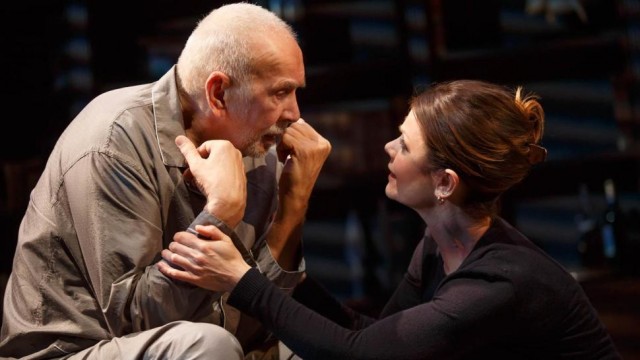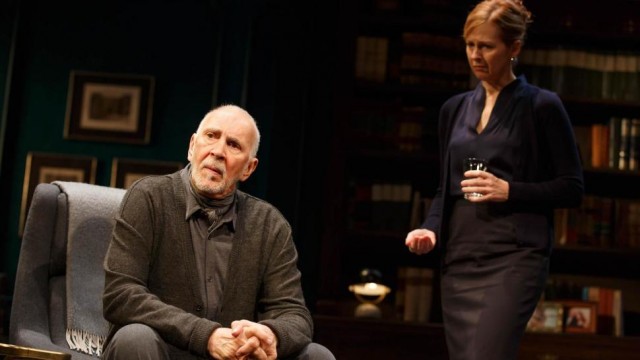
André (Frank Langella) doesn’t make it easy for his daughter, Anne (Kathryn Erbe), to help him in THE FATHER (photo by Joan Marcus)
Manhattan Theatre Club at the Samuel J. Friedman Theatre
261 West 47th St. between Broadway & Eighth Aves.
Tuesday – Sunday through June 12, $70-$150
thefatherbroadway.com
www.manhattantheatreclub.com
In early 2014, Frank Langella played King Lear at BAM, a thought-provoking counterpoint to his latest show, the U.S. premiere of Florian Zeller’s The Father. As Lear, the seventy-eight-year-old Langella, who has won three Tonys and two Obies, battled his failing mind and body while two of his three daughters fought over his wealth and power and the third only wanted to love and care for him. As eighty-year-old André in Zeller’s Olivier-nominated, Molière Award–winning play — not to be confused with August Strindberg’s The Father, currently running at Theatre for a New Audience — Langella is an elegant Paris gentleman dealing with the early stages of Alzheimer’s disease while his loving daughter, Anne (Kathryn Erbe), tries to care for him despite his mistreatment of her. After scaring off yet another home nurse, André yells at Anne, “I don’t need her! I don’t need her or anyone else! I can manage very well on my own!” But it’s becoming more and more apparent that he can’t, as he gets lost in a psychological maze of the past and the present, not knowing who is who and where he is while refusing to acknowledge what is happening to him, instead turning the tables on those around him. “I’m worried about you,” he says to a woman (Kathleen McNenny) who claims to be Anne but he does not recognize. “Don’t you remember? She doesn’t remember. Are you having memory lapses or what? You’d better go and see someone, my dear.” He also mixes up Anne’s significant others, either boyfriends or husbands (Charles Borland and Brian Avers) who may or may not be moving to London with her. And he compares his latest caretaker, Laura (Hannah Cabell), to his beloved other daughter, Elise, whom he wildly praises while disparaging Anne. “You have two daughters?” Laura asks suspiciously. “That’s right,” he says. “Even though I hardly ever hear from the other one. Elise. All the same, she was always my favourite. . . . I don’t understand why she never gets in touch. Never.” In addition, André seems to be forgetting whose apartment he’s in and whether he’s living on his own or with Anne, which makes him angry and upset. “I don’t need any help from anyone and I will not leave this flat,” he firmly declares. But he’s of course in dire need of help.

André (Frank Langella) ponders his frightening future in Florian Zeller play (photo by Joan Marcus)
Translated from the French by two-time Tony winner Christopher Hampton (Les Liaisons Dangereuses, Sunset Boulevard) and directed by Tony winner Doug Hughes (Frozen, The Royal Family), Zeller’s play, a companion piece to The Mother, uses clever stagecraft to depict André’s heartbreaking descent. Scenes sometimes repeat or overlap, and having multiple actors play Anne and her partners transfers André’s confusion to the audience, which is also sometimes not sure who is who or if what is happening is only in André’s fading mind. Each scene ends with a sudden darkness, and when the lights come back on (courtesy of lighting designer Donald Holder), bits of Scott Pask’s fashionable French-flat set, from books to furniture, have disappeared, echoing the cognitive losses inside André’s head. André is also obsessed with time, as if, deep down, he really does understand the fate that awaits him but is unwilling to face the truth. He keeps thinking someone has stolen his watch, and he continually refers to time. “Time passes so fast,” he says wistfully. Later he opines, “If this goes on much longer, I’ll be stark naked. Stark naked. And I won’t even know what time it is.” Langella (Frost/Nixon, Dracula) goes from bold and confused to touchingly gentle as André, imbuing him with a Lear-like regalness and an aristocratic refinement even when tap-dancing; it’s a beautifully moving performance from one of America’s finest actors. Zeller, Hampton, and Hughes avoid genre clichés or sentimentality, using clever subtlety to tell a very sad, unfortunately increasingly common tale.